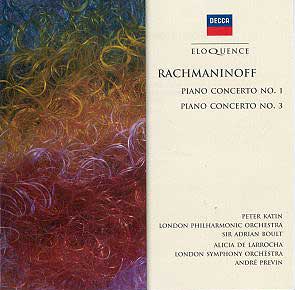Larrocha's way with Rachmaninov 3 is studiedly
poetic and leisurely - Florestan rather than Eusebius. Rachmaninov is
left sounding closer than ever to Medtner. Larrocha also brings
the concerto closer to Schumann than to the moody, unsettling, subversive
restlessness we usually associate with this composer and this concerto.
Certainly there are isolated flourishes and slashes
of virtuosity but the dominant hallmark is one of musing reflection.
Larrocha creates world enough and time to allow the music an evolutionary
effluorescence. The sound colludes in this approach - velvety and warm.
Whatever the virtues, ultimately this comes across
as eccentric, as a dissection in the aural equivalent of slow motion
photography. The finale still warms the blood and you are conscious
of the orchestra, that was very much Previn's, playing with a possessed
pathos. As ever with such extremes, one learns new things about well-beloved
works, but this version belongs in the unhurried and extremely idiosyncratic
company of Ida Haendel's Elgar Violin Concerto (Testament) and Bernstein's
Elgar Enigma (DG). For first choices go for Earl Wild on Chandos
and Argerich's classic account on Philips.
If you need a holiday from larger than life Slavonic
temperament this could well be for you and in the finale Larrocha has
you won over. I loved her way (and Previn's) with the pay-off climactic
episodes in the last few minutes of the concerto.
The First Concerto sounds a shade boxier than
the de Larrocha tape. Boult keeps things moving along nicely and his
climaxes are tense and nervy - as tetchy as his impressive Sibelius
tone poems on Everest (Omega). Katin makes less of the andante than
Wild but he otherwise gives a sound and often exciting twist to the
music. The rasping brass are extremely well rendered in the finale.
This is more of a mainstream approach than the Larrocha.
This is a worthwhile super-bargain pairing of a highly
personal peripheral reading of the Third and a sturdy mainstream version
of the Tchaikovskian First.
Rob Barnett


![]() See
what else is on offer
See
what else is on offer 